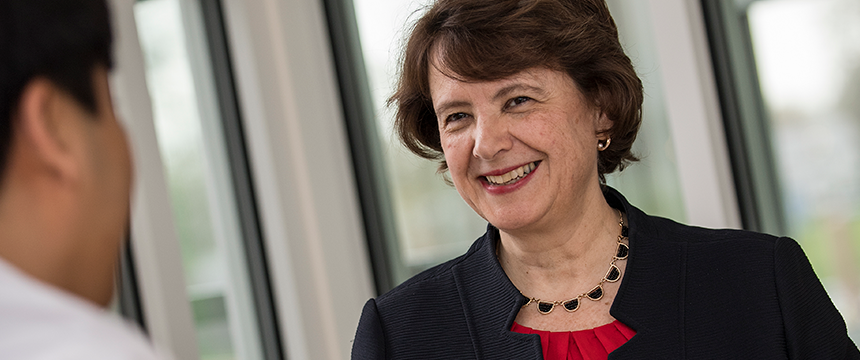Q&A with Dr. Yam

The mission and legacy of Notre Dame is powerful. It caught my attention and was the impetus behind my application for the presidency. Educating leaders to change the world is a very empowering mission—one that I felt would fuel my work as President. Notre Dame was the first Catholic women’s college to award the four-year baccalaureate degree, and I felt that with this legacy, this mission, it would be an honor for me to serve.
Notre Dame has a rich blend of the liberal arts tradition and professional programs. Students learn about critical thinking and communication. They learn how to work in groups. They learn about civic engagement. With this knowledge and skill base, students are well-prepared to excel in the 21st-century workforce.
It is documented that a Catholic liberal arts education helps to promote a dialogue between faith and reason. Catholic values—ethics, education and research for social betterment—empower our students and help them grow, both in reason and in faith. They prepare students both for career readiness as well as life satisfaction. The Catholic tradition encourages students to engage in reflection, prayer and liturgy, all of which promote the spiritual growth of the student.
Our future looks very promising. The University has so many strengths: the blend of the Catholic, liberal arts tradition with the Women’s College at its core; its professional programs, especially the programs in education and health care; the English Language Institute and a commitment to global citizenship; and programming for first-generation students—all of this positions Notre Dame for growth. I’m looking forward to working together with the Notre Dame community to develop a strategic plan that will promote the University’s distinctiveness, expand enrollment, establish innovative partnerships, engage in program development, strengthen and expand infrastructure and grow our financial resources.
It’s well-documented that those who attend women’s colleges are twice as likely to pursue advanced study at the master’s and doctoral levels and to pursue careers in the STEM disciplines as those who attend gender inclusive institutions. We know that women’s colleges do a phenomenal job in engaging students and providing them with exceptional leadership opportunities.
I first became interested in domestic violence as a professional practicing nurse. I saw first-hand the trauma that those women endured. We treated them physically, but I felt there was more we could do in terms of preventing violence and empowering these women. That led me to take on the study of the issue through my master’s and doctoral work. It certainly shaped what I did as an educator. I was able to develop courses and coursework related to domestic violence in the nursing curricula. And my publications and my research agenda have focused on the empowerment and enhancement of self-efficacy of battered women.
I remember one woman who came to the emergency department and then to our nursing unit because she needed to have surgery due to injuries related to abuse. It was really in caring for her and talking to her that I began to understand the emotional trauma she went through. She eventually began to open up during post-op, and I began to see that it’s important to not just treat these women physically but also to think about what’s going to happen when they leave the hospital. That was really the impetus for my work.
I can’t wait to get started. We are embarking on a new strategic plan, and it’s very exciting to be part of that. Our strategic plan will provide us with our blueprint for going forward with our mission and advancing the institution. I’m looking forward to working with everyone and getting to know the Notre Dame community. My husband David, my son Michael and I certainly had a very warm welcome at the official announcement on campus. And I look forward to rolling up my sleeves and being part of the community.

